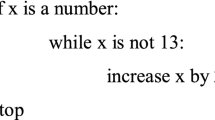Abstract
The paradox of predictability refers to situations in which, even in a deterministic universe, a correct prediction of a future action is seemingly impossible because the agent whose action is predicted is determined to act counterpredictively. In a recent contribution to this journal, Victor Gijsbers provides an example of the paradox in which the undecidability of the situation plays an essential role and claims, additionally, that this undecidability is at the root of all examples of the paradox. This paper argues, first, that the latter claim is not correct because there are clear examples of the paradox in which the situation remains fully decidable. The paper argues, secondly, that, because of its reliance on rather artificial conditions and in contrast with examples referring to the physical nature of the predictor, the example presented by Gijsbers, though technically correct, has little relevance for our understanding of the role of (counter-)predictability in the context of human interactions.
Similar content being viewed by others
Notes
Note that the physical nature of the prediction is itself not sufficient to trigger the paradox. In this case, if EM ‘knows’ that A = 1 is the correct prediction, this means that it has effectively done the ‘computation’ and stored this result (its own P*) in its memory. This prediction is thus physical (a hardware memory recording or a human brain state, depending on the nature of the predictor) and correct at the same time. The problem, from the point of view of the embedded predictor, is that it is stuck with this prediction P* and cannot reveal it without thereby invalidating it.
EM could, alternatively, make a ‘random’ choice or refuse to provide a prediction. Both cases still constitute a failure to correctly predict and remain ‘decidable’ for both EM and EX (assuming, as always, that EX has full knowledge of the state of the universe and, thus, also knows which deterministic algorithm EM will use to ‘randomly’ make a decision).
Importantly, G is not capable of responding to that shift by also changing the mechanism that it uses. External predictors, by definition, do not causally interact with the universe, so G cannot possibly be informed about the actions, or even the existence, of the external predictor. Its counterpredictive action is, in this sense, also necessarily entirely unintentional.
With arguments such as these, we inevitably run into the problem that the concept of ‘external predictability’ is not very well defined. It is unclear what kind of powers we are allowed to attribute to the external predictor ‘outside of the universe’. This probably constitutes a good reason for dropping the concept altogether.
In our paper we called this ‘take-it-or-leave-it control’, but ‘counterpredictive control’ seems more straightforward.
Even attempts to secretively use knowledge about the future are vulnerable to potential counterpredictive action. By using his supposed knowledge about the future in his (necessarily) causal dealings with the predicted agent, the predictor engages in interactions that could lead to the discovery of the prediction or, more indirectly, to causal constraints which make the set of equations needed for prediction once more unsolvable (Rummens & Cuypers, 2010, p. 243).
References
Gijsbers, V. (2021). The paradox of predictability. Erkenntnis. https://doi.org/10.1007/s10670-020-00369-3
Holton, R. (2013). From determinism to resignation; and how to stop it. In A. Clark, J. Kiverstein, & T. Vierkant (Eds.), Decomposing the will (pp. 87–100). Oxford University Press.
Ismael, J. T. (2019). Determinism, counterpredictive devices, and the impossibility of Laplacean intelligences. The Monist, 102, 478–498.
Rummens, S., & Cuypers, S. E. (2010). Determinism and the paradox of predictability. Erkenntnis, 72, 233–249.
Rummens, S., & De Mesel, B. (2022). A Wittgensteinian account of free will and moral responsibility. In C. Eriksen, J. Hermann, N. O’Hara, & N. Pleasants (Eds.), Philosophical perspectives on moral certainty. Routledge.
Scriven, M. (1965). An essential unpredictability in human behaviour. In B. B. Wolman & E. Nagel (Eds.), Scientific psychology: Principles and approaches (pp. 411–425). Basic Books.
Author information
Authors and Affiliations
Corresponding author
Additional information
Publisher's Note
Springer Nature remains neutral with regard to jurisdictional claims in published maps and institutional affiliations.
Rights and permissions
Springer Nature or its licensor holds exclusive rights to this article under a publishing agreement with the author(s) or other rightsholder(s); author self-archiving of the accepted manuscript version of this article is solely governed by the terms of such publishing agreement and applicable law.
About this article
Cite this article
Rummens, S. The Roots of the Paradox of Predictability: A Reply to Gijsbers. Erkenn (2022). https://doi.org/10.1007/s10670-022-00617-8
Received:
Accepted:
Published:
DOI: https://doi.org/10.1007/s10670-022-00617-8



